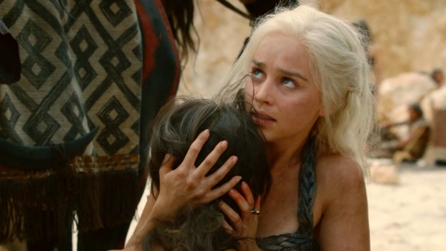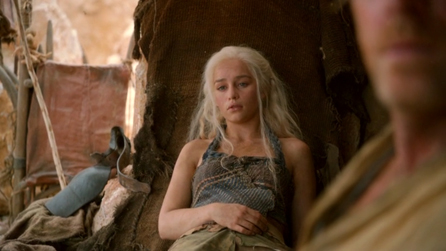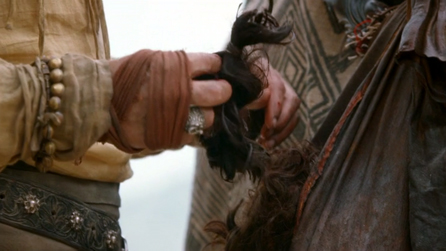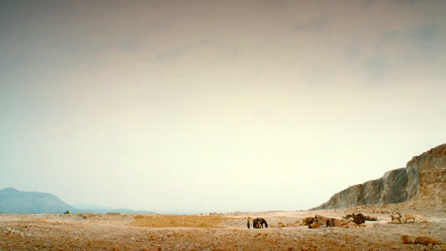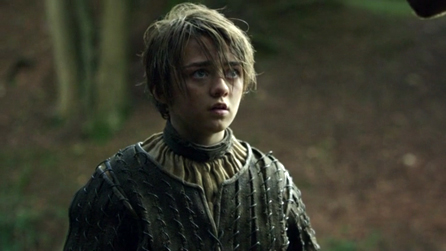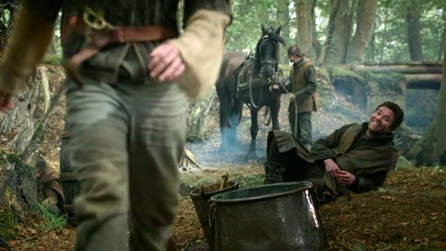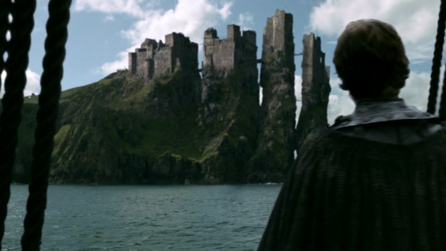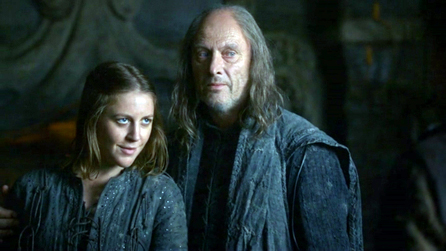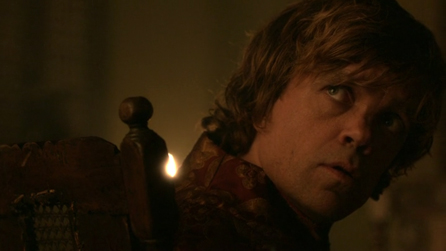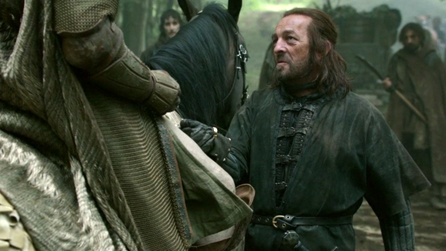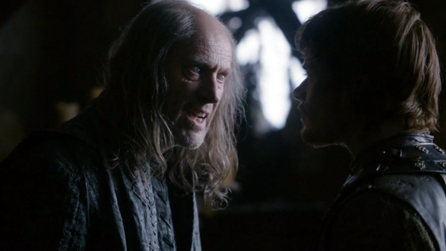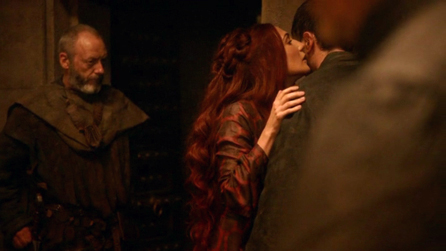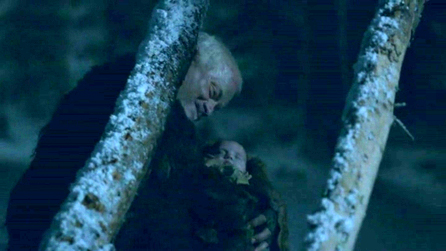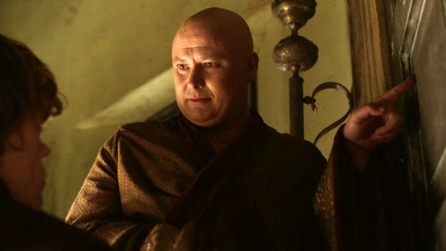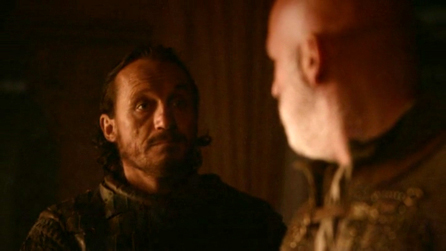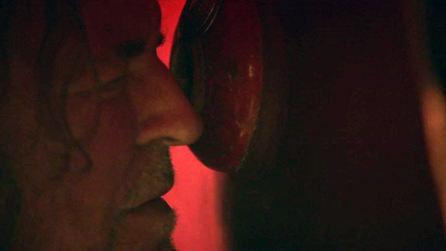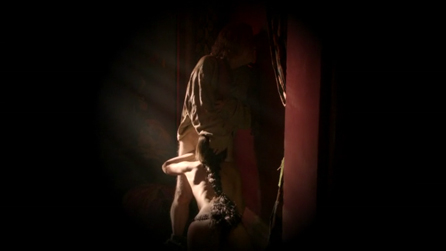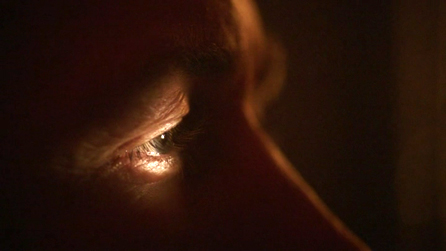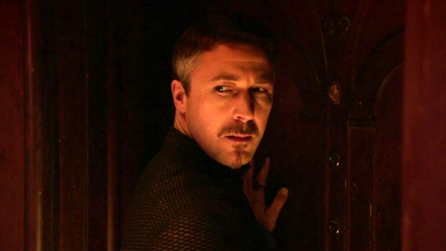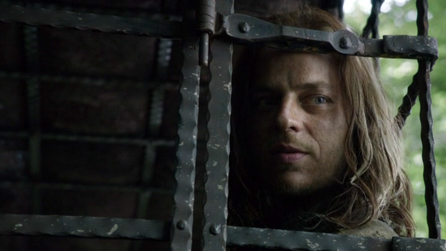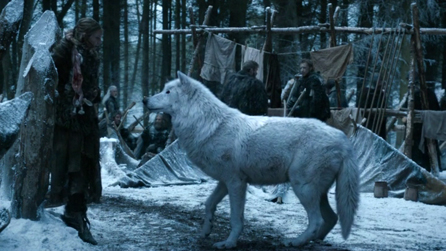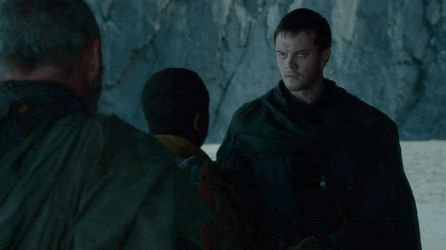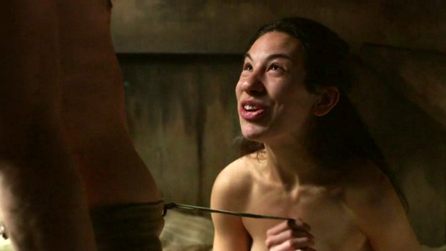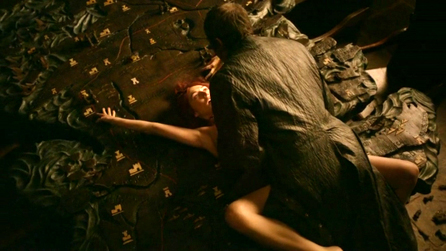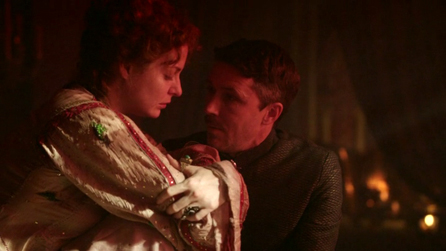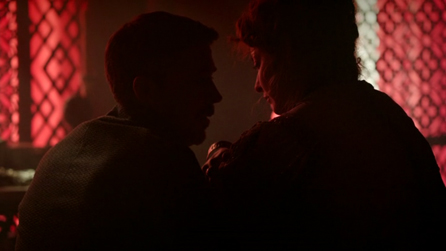THIS WEEK on Game of Thrones: “The Night Lands”
This is the week everything could go wrong for a heavily serialized show like Game of Thrones. It’s the second episode of a second season; a show can knock an audience on its ass one year with a perfect storm of timing, talent and spectacle, and then lose it all during the hiatus. A shoddy premiere can rest on the laurels of its fans’ frothing anticipation and still come away with merit.
We’re pretty fortunate then, that we got the premiere we did, and the second episode to prove shit’s still on track. The immense task of adapting Martin’s ‘song’ is somehow, somehow still staying faithful to its source text. Ponder that, and marvel at it after every episode.
A note to all readers: it’s my hope to avoid recapping the show in favor of picking it apart instead. There are enough point by point recaps out there; you watched the episode, you remember what matters. All I want to do every week is highlight details, tease out insinuations, follow some threads to strange conclusions, and wax nostalgic about the hour of television that was bestowed on us. If I manage to weave something intelligible out of all that, or enrich your appreciation or understanding of the episode, so much the better.
And a promise here that any television viewer and non-reader of Martin’s books is safe reading these articles, though I can’t make any promises about the comment sections below!
Settle in, and reminisce with me on this second hour of the season.
“The Night Lands” follows a premiere that had to revisit every loose plot thread and staging ground that the show’s first season set up. Don’t be too surprised then that week by week, we’re not going to return to each of Westeros’ principal movers and shakers.
The first thing that’ll cross your mind after Jon Snow takes an axe hilt to the head and the credits roll is, ‘Wurr my Starks?!’. Count off the absentee list with me:
– No Robb
– No Catelyn
– No Sansa
– No Bran
– No Joffrey
The world of television criticism is still leveling their resentment at the show for ‘killing off its main character, its heart and soul’ in Ned Stark, somehow oblivious to the fact that literally a whole world of fascinating characters still populates the screen.
It’s a challenge for the show to deal with though; we are still reeling from the absence of Ned and Robert. And this week, we had to make do without almost all the other Starks, without the ever-entertaining Joff (the addled, villainous little turd is fun to watch, if only because we love to see him continue to earn what’ll hopefully be his head on a spike one day), and notably, with only one more brief visit to Daenerys in the east.
That short, despair-laden scene is where this episode takes its title from. Immediately prefaced by the cold north of Craster’s Keep, the scene is a harsh juxtaposition; brought to us with a slow, ponderous, hazy pan right to Jorah Mormont’s exhausted face, as if the cameraman himself was dehydrated to near-death as well.
Dany promises Rakharo’s (presumed?) lover that his death will be honored, and that his soul will still ride into the eponymous Night Lands, where dead, revered Dothraki must hope to go.
If the opening moments of this scene were there to remind us of Dany and company’s continued embattlement with the elements, the closing is to remind us that tradition and memory are still among the most valued things in this world, after power. The season opened with “The North Remembers”, and a ravaged Stark family still driven and riven by the memory of their patriarch’s fall. And here, this story’s chapter is entitled by the embodiment of the Dothraki afterlife, the promise of what is to come when memory is all that we have left, and our soul looks for a new home.
The show continues to treat its audience like intelligent adults; Rakharo’s braid has been cut, and astute viewers will remember why this murder is the insult it is meant to be — why Dany must be insulted and angered on behalf of her new people. Here is the Dothraki tradition essentially mutilated. If Daenerys wasn’t yet this girl’s queen, she makes a promise, holds her tight and proves she most certainly is her khaleesi now.
Dany earns the respect of her people with blood and death, even if she suffers both in stride at the same time. The sudden cut to a distant long camera shot gives power to the final pained, bloody scream Dany’s girl practically exhales. That scream is one more badge of honor for the new khaleesi; a new task to see to, and one she knows can help her command the horde in the days to come.
We’d be remiss not to remember what the North has almost forgotten about for now; Arya Stark, now ‘Arry, on the road to the Wall in Yoren’s company.
It’s a genuine fucking pleasure to watch this young actress light our screens up again for the first time in near a year; she’s everything that’s right with this bloody world, and one of few real conduits through which the audience can experience the world with innocence intact.
You wouldn’t know that the actor playing Robert’s bastard, Gendry wasn’t more than a guest spot last season; he fits right into the ensemble, and the chemistry between him and Arya is palpable and real — no doubt high among the list of what readers of A Clash of Kings were hoping for most this season.
If power tied together the dissonance of the premiere, it’s memory that binds together most every scene this week. So much of the chemistry between Arya and Gendry is in their mutual reminiscence of what they were and what they are, what they’ve lost and why it almost doesn’t matter anymore. Gendry’s had longer to make peace with not having every memory he needs to put together his identity; Arya’s just starting down the awful road of divorcing herself from what she was. Most important is that you know she’ll never forget that she’s a Stark; watch how she defends her father’s honor to her new companion, with barely yet enough time to know if she can trust him. Her sense of justice is remarkable and intact, a rarity in someone so young. With luck, it won’t get her killed.
Theon takes center stage in two scenes this week, and his chief enemy is memory. Or more precisely, the lack of it. The heir to Pyke and the Iron Islands expects a fucking welcome mat the length of Westeros as he sails to his father, Balon Greyjoy. He expects five-star treatment from the guards, adoration from the common people, and the memory of his capture and loss to grant exuberance and joy to his father upon the boy’s return, now as a man.
For Theon, everything begins to unravel quickly as his own memory fails him. He’s forgotten the iron way of his people and his father, a prepossessing attitude Balon quickly strips him of. He’s forgotten his own sister Yara, humiliating himself after this season’s token dip into the incest wading pool. He’s forgotten about the possibility that he actually might matter even less to his own family than he did to House Stark.
Worst of all, he’s forgotten what he represents to the Greyjoys; absolute loss and enmity between Balon and Winterfell. His return incenses his father and elevates his cause all the more. The scene’s closing line: “Who said anything about the Lannisters?” — with half the scene spent on remembering what the Starks did (or didn’t do) to Theon during his decade as a captive, and a dismissal of House Lannister as the target, Balon’s enemy in his newly proposed war can only be one house.
The only question to ask is, which memory will Theon align himself with? The honor and love of his own emotionally-distant family (tempered with present hostility), or the resentment of his former captors (tempered with present brotherly bond in Robb)?
If Balon has his way, he’ll be the fifth self-styled king in play, alongside Joffrey on the throne, Renly in the south, Stannis in the east and Robb in the north. But there’s more power in Westeros than the crowns.
Near the end of this episode, Tyrion offers his sister one final lesson in remembrance in the episode’s most poignant scene. The unseen ‘sixth’ king in this War of Five Kings; the people. The mob. Despite everything happening almost at once in this complex and intricate world, the horror of last week’s closing scene can’t be forgotten or dismissed easily, and Tyrion is our conscience for remembering it.
Watch how Tyrion’s lines escalate, each one begging a reply from Cersei that never comes. It’s the equivalent of dialogue holding its breath, with one side huffing and inhaling, and waiting to exhale only when the other party says something, but it doesn’t happen for several uncomfortable moments.
Tyrion: “You might find it difficult to rule over millions who want you dead. Half the city will starve when winter comes, the other half will plot to overthrow you. And your gold-plated fellows just gave them their rallying cry: The Queen slaughters babies.”
A pause for a reply, and none comes.
Tyrion: “You don’t even have the decency to deny it.”
A pause for a reply; still none comes. Cersei can’t even look at him.
Tyrion, with realization: “It wasn’t you who gave the order, was it? Joffrey didn’t even tell you…”
Still, no reply.
Tyrion, pointedly: “…did he tell you? I imagine that would be even worse.”
Finally, Cersei: “He did what needed to be done.”
That’s how dialogue reinforces the magnitude of a dramatic situation, and it’s why this scene elevated itself above all others this week (notably also giving Lena Headey, the actress playing Cersei a real chance to shine).
The people bear the brunt of this memory, the murder of innocent bastards, quite literally in the streets of King’s Landing. His caution for his sister is that they won’t just forget this. And what good will the power of the throne be if the people decide they won’t bend their knees to it any longer?
RUMINATIONS: Below, the many thoughts and points that don’t fit into my diatribe on memory in Westeros.
The Economy of Language: Yoren of the Night’s Watch threatens a gold cloak with a dagger (and wins), informing the soldier that after he nicks just the right artery, there’d be no one around to ‘un-nick’ it. It’s a clumsy, beautiful mangling of language that communicates all the right messages in one word: that Yoren hails from a lower class that’ll fuck with words to get meaning across with all haste; that the resources in play are actually at quite a minimum — there probably isn’t a medic in the troupe; and that in Martin’s world, you really can bring a dagger to a sword-fight and win — the realism is staggering in a world that’s still overflowing with the supernatural. One ‘un-nickable’ nick can end a life, and often does.
And with the meeting of Balon and his son Theon, the perfect, succint line to summarize their relationship in a quick stroke: “Stark had you longer than I did”. In seven words: a father’s pain at losing his son to his enemy; a call for attention to Theon’s identity being shaped more by the Starks than by the Iron Islands; and of course, an interest (or a demand?) as to what Theon has become in the intervening years — and assuredly, an implied expectation to go along with it. All that, in seven words.
Finally, Melisandre delivers a line to Davos’ son: “Death by fire is the purest death.” Where has this show demonstrated that before? Against the undead, the Wights of the North. And who combats them? The Night’s Watch. And if they’re creatures of the night (stretch with me, feels good, right?) and Melisandre’s prayer proclaims “the Night is dark and full of terrors”… well, let’s just say I have every confidence that when this story wants to drop a phrase into the mix repeatedly, that every word is chosen carefully. So much, in so few words. Or in this case, just one word, and some glorious re-contextualization.
This saga is titled “A Song of Ice and Fire”. It’s a beautiful title to take metaphorically, but if we want to have some fun with literal interpretations…I’ll let everyone draw their own conclusions, now that the fire’s shown up on two fronts (Mel, and Dany’s dragons), and the ice, well, just have a look North.
Resources at a Premium: Cersei can’t and won’t spare more soldiers for the Wall when Mormont’s plea comes by raven. Daenerys and her khalasar are practically dead already from dehydration and are losing more all the time. The Night’s Watch is so desperate for resources that they’re shacking up with a man whose Keep is packed with women who are all somehow both his daughters and his wives. Yoren and company disarm the gold cloak that comes for Gendry, taking his steel for the Watch, which apparently can’t even stay well stocked enough by the Crown. Stannis hasn’t yet moved to claim what is rightfully his because he just doesn’t have the manpower. Everyone’s comin’ up empty, and the force that taps into hidden new resources might be the winner, if they strike fast enough.
Houses, New and Old; Traditions, New and Old: The Dothraki demand a burning of the body to send their dead to the Night Lands. The Starks bury their dead beneath their ancient keep, valuing the proximity of the family. The Lannisters…well, for all we know they melt down some gold and embalm their dead, swapping out their blood for molten coin. Craster’s Keep is nowhere near so old or steeped in tradition, but even his ‘House’ has a ritual for death; he staves it off by pronouncing it prematurely on his newborn, infant sons. This is the richness of the world-building in Westeros; every new locale has processes and idiosyncrasies, habits and movements, already all in motion. We’ve yet to see what this particular tradition of Craster’s yields, but it can’t be anything particularly rosy.
The Spider and the Master of Coin: Varys and Tyrion share a moment at the start of the episode that shows a rare malevolent side to the eunuch. Varys, like Petyr ‘Littlefinger’ Baelish, seems to know everything worth knowing in King’s Landing and the rest of the Seven Kingdoms. Now, Varys is brandishing the heat with his knowledge that only Petyr has in the past. Can a story really function properly with an infallible character? One that seems to always be in full mastery of events, causality and knowledge? Can it function with two? What’ll happen when these two forces are ever forced to compete or contest one another? Who says that’s not happening already behind the scenes? In “Fire and Blood”, season one’s finalé, the two briefly traded barbs and jests with a definite, searing hostility undercutting the entire scene. With luck, they’ll meet again on set before long.
The Strange Primacy of the Sellsword: Check out Bronn! Suddenly the Captain of the Gold Cloaks, when half a season ago he could have been thrown out of the Moon Door at the Eyrie, left a smear on the mountainside. He’s a man willing to do anything for the right price, and in the employ of the Lannisters, the right price is probably always going to be within reach. Tyrion is very definitely thinking about this too, when he asks Bronn if he’d kill a suckling babe without question, to which Bronn responds that he would have a question: ‘How much?’ So the new question is, can Tyrion bring himself to ask such things of his new sellsword? Or is he suddenly aware that he might be breeding a monster as terrible as his boyking nephew? And worst of all, is that new monster not Bronn, but himself?
Cinematography, Part Deux: Once again, the moments of most interesting camera work belong to the scenes of Petyr Baelish, Littlefinger. Watch the stills below. A peephole view of a brothel scene, a customer and his (or her?) whore. And then a man, looking through that peephole. And then, interestingly, that peeping man and his own whore, being peeped at themselves. And who is the ultimate peeper? Our man Petyr. There isn’t a grand point of theory to be made this time around — just that Petyr almost-assuredly has his bases covered, and even when someone thinks they’ve got the chief eye of espionage, Littlefinger is watching it all from a higher perch altogether.
It’s a fun suggestion of the way espionage and whispers make their way around King’s Landing and Westeros at large. The brothel is being gazed at by itself, and then that gazer has the eyes of the brothel-master on him, and then finally, we have our own eyes on Petyr. It’s a tunnel of gazing; three full degrees of gazing. I’m tempted to take a picture of myself watching Baelish on the television screen just to take it up a notch and make it four. It begs the question though; was anyone else within the story in a position to watch Petyr?
New Character Spotlight: The show’s economy of time means nothing and no one gets introduced without matter or consequence. While you’re still settling into your couch and snackin’ on goods, the show drops in a new face that might get forgotten quickly: Jaqen H’ghar. What do we know about him? He’s in a cage with two truly unsavory types, likely murderers or rapists (half the men marched to the Wall are guilty of crimes; the ones in the cage were likely guilty of the violent ones). He makes a point of distancing himself from them to Arya. He hails from the “Free City of Lorath”. He talks of himself in the third person. Half his face is always garbed in shadow. And he’s pretty. Dude smiles at Arya’s courage; maybe he’ll be taking advantage of it shortly.
New (less interesting) Character Spotlight: Gilly, one of Craster’s daughter-wife-monstrosities gave us a reason to briefly spy an all-growed up CG Ghost (who else fist-pumped at his majesty?!), and has suddenly given Samwell something to do for the rest of the year. She’s pregnant, desirous of escape from her father-husband-master-craster, and chose the fattest, most incapable brother in the world to help her. Doubtlessly, this will annoyingly complicate anything the Watch tries to do for many episodes to come.
The fun point here is Sam’s angle on the whole thing; when Jon accuses him of wanting to steal her away from Craster, Sam replies, ‘I can’t steal her. She’s a person, not a goat’. I want to believe he innocently and naively believes that people can’t be owned and sold, in a world where even some of the people with the best intentions once kept slaves (of a sort), like our own Daenerys Targaryen. Or maybe he knows better, and is just asserting his beliefs in everyone’s ownership over themselves; Gilly hasn’t sworn any vows, and for Sam, it should be up to her if she wants to take ownership of herself and escape.
New (awesome, and final) Character Spotlight: Welcome to the ring, the marshal of Stannis’ newest forces, Salladhor Saan. A fellow smuggler and pirate from Davos’ past, a most-welcome new presence and the perfect amount of crudeness and bluster to add into the mix. Stannis needs ships to take King’s Landing, as would any contender. They’re all intending to storm the Blackwater (Bay), which King’s Landing sits on the mouth of. Salla gives Stannis sea-power, and a lot of heart that’s been missing from the Dragonstone corner of the ring. Choice moment: Salla’s 9000% premature claim to Cersei’s heart…between her legs. Choicer moment, when Salla’s desires are questioned by Davos’ son: “You don’t know how persuasive I am. I never tried to fuck you.”
Show/Book Diversions: Yara’s name was changed from Asha, again, to avoid confusion with the wildling Osha. Scenes only implied in the books get center stage in the open, like Stannis and Melisandre’s playtime on the Painted Table. Additionally, it would seem all of Davos’ many children have been distilled into one. It also goes without saying that anything that seems to happen with show creation Ros the whore is usually something new too; this week, that content was mostly just a fun way to learn more about Littlefinger.
Finally, Rakharo, Dany’s bloodrider met a new fate in this episode. Martin has gone on record to say (when a similar event killed off a character in the first season that remained alive in the books) that the show may have to deal with finding its own way in some matters, as its irreversibly changing a few things that even Martin hasn’t finished plotting with, and he’s still writing the sixth of a proposed seven books. Either way, it’s still nice to see that the show is acknowledging itself as its own beast; we can just hope that it’s doing so with purpose instead of shock value.
Shock Value Master-Class Segue — onto the discussion on everyone’s mind:
HBO, Sexposition, the Text and the Tits: This is a lengthier mini-discussion, so skip to the end below if this topic doesn’t interest you.
Game of Thrones isn’t the first show or film to communicate some of its plot alongside ejaculation and edging. A web scholar by the name of Myles McNutt seems to have been accredited just last year with the term ‘sexposition’ in his blogging and critiquing of this very show (which is bizarre, even admittedly so by Mr. McNutt — since I very distinctly recall the term being bandied around in cinema and film theory classes nearly ten years ago). Nevertheless, it might be a show like this that demands that the phenomenon be given a title, and thanks be to Myles for labeling it.
So the questions are: Do we like it? Is it needed? Is it cheap? Is it perfect for a show like this? Would we miss it if were gone?
I’m not going to bother answering all those because this is easily the most heated point of contention among fans discussing the show and way too many views are colliding without compromise. So here’s mine: this world and this story haven’t shied away from realism yet, and hopefully never mean to. They foreground it, as a matter of fact. Remember Robert, in the first season, on his first kill on the battlefield: “They never tell you how they all shit themselves. They don’t put that part in the songs.” And Shae, the funny whore, just last week, on the scents and pleasures of King’s Landing: “This city stinks…like dead bodies…and shit…and cum, and garlic, and rum.” And never let it be said that the show doesn’t dwell on the spectacular ways a man can die at the end of a weapon or the side of a brick wall.
Why then should it shy away from the very real part of all human worlds that is sex? Where bonds and alliances are forged and broken, where truths and falsities are revealed and made alongside thrusts and moans? That shit happens. Why wouldn’t it happen in this world?
Sure, the criticism most mentioned is valid: how better to keep a viewer rapt with attention to an otherwise monotonous monologue than to slap on some breasts, insert a nod at assplay, or in this week’s only debatably unnecessary inclusion, the sensation of snowballing (there was definitely more fresh baby batter in Eremka’s mouth that Petyr didn’t manage — or mean — to wipe off).
I don’t know how to combat that criticism except to say, hey, we’re in a brothel. In a dirty fucking city. In a very real world. And sometimes we might need to be reminded of that world’s vulgarity, its commonness, its humor, and its total despair. It’s the same with Dolorous Edd’s remarks on farting when we first visit the Night’s Watch at Craster’s Keep; better still, his juxtaposition of the esteemed passage of gas through the anus alongside his mother’s death. This isn’t Tolkien’s high fantasy of the West. It’s George R. R. Martin’s medium-rare fantasy of Westeros. Snowballs included.
The vulgarity is admittedly why we love this world, and why we hate (and love to hate it).
And take all this merely as a defense for just the aforementioned, debatable scenes. Others, like Theon’s dominance of the captain’s daughter on Pike, and Stannis and Melisandre’s tango on the table are necessary, vital moments for character and plot, lifted from the text for those interested. Theon is a total, unabashed scoundrel, and it’s only appropriate that we learn what’s tinkering around in his confused, addled head while he’s finding another head to stick it to. We learn how the Ironmen take numerous salt wives as tokens of conquest, even as Theon denies that meager title to the woman he fills up, right as she begs for it! There is no more economical way to pack that much of Theon’s character into one scene, and the scene actually deserves some respect for it.
As for the Warden of the East: while the scene should rightly be criticized for its brutal symbolism — having the pair fuck on a scale recreation of Westeros as the many figurines representing its people and its lords fall to the floor in a clatter — the choice to foreground Melisandre’s sexuality can’t be totally dismissed. From the moment her unique redness and beauty, rarely seen in other women or characters in the show, came across our screen, we knew we were dealing with something sexual, feminine and powerful.
Ask the more important questions instead: is Melisandre more the fraud, and playing Stannis to bed one of the contenders to the Iron Throne? Or did she exhibit real power when Cressen failed to poison her last week, and is this sex a part of all of that?
And don’t forget that the soon-to-be-meme’d snowball scene segued nicely into a scene with Ros and Petyr that accomplished two important things: Petyr is a resourceful menace and a forgotten player in this game. And Ros is emblematic of a people that won’t forget the horrors they’re starting to witness.
Me, unable to help myself, bringing the camera back into things: On a final cinephile nerd-out note, I don’t think it was any accident that the camera hopped the 180-degree line several times as Petyr doled out his threat to Ros.
(http://en.wikipedia.org/wiki/180_degree_rule).
Any director or filmmaker worth their salt knows to obey that rule, and knows that they’re invoking a deliberate message when they choose to break it. You can’t get a good grip on Petyr, visual or otherwise. Every angle and eye on him is different, he’s not to be trusted, and distorting the visual space around him imbues him with filmic power. Yeah, I’m beating off to my cinema studies degree right now (and wiping up after myself with it too).
The Technical Notes and Misfires of the Week: So as to avoid confusion with the wildling Osha for HBO’s audience, Theon’s sister Asha was renamed from the text to Yara. And on an unrelated note, the magnificent credit sequence that begins every episode is suddenly exhibiting a serious mark of laziness: the locations depicted don’t match up nicely with the action of each episode any longer. Obviously, this is a matter of cutting expenses (the geographical ground covered by a story moving this quickly would require a new sequence for the intro almost every week), but for those who’ve been paying attention, it might contribute to some confusion.
Dragonstone was properly added last week, and Pyke was beautiful rendered yesterday, but most of the remaining locales present inaccuracies. Dany and company are no longer in Vaes Dothrak, but far east of it in the Red Wastes (those well-versed in the text can correct me on that), and Mormont’s expeditionary force — including Jon and Samwell — are well north of the wall at Craster’s Keep. Winterfell was included last week to spotlight Bran, but this week it appeared in in the introduction without cause; this might be the first episode we spend away from Ned Stark’s home.
More Babbling about the Incredible Intro: While we’re talking about the brilliant introduction: astute listeners will have noticed that a variation of the theme is being being used this season. And I’m not talking about the awful/artificial extension of extra bars used to pad the sequence (changing its length week by week), but an altogether different sound most noticeable at the start, where there’s less percussion and a slightly more somber tone.
Season One: http://www.youtube.com/watch?v=s7L2PVdrb_8
Season Two: http://www.youtube.com/watch?v=UDPz7Ps_Vrs
Remember, I’m not talking about the extra bars here; that’s changing every week to accommodate credits changes for length. I’m referring to the change in the music in the first ten seconds or so. An acquaintance of mine suggested that the newer version was first used for “Fire and Blood”, to signal the tone shift after Ned’s death. I’ll check that out for next week.
FOR DETAIL-NERDS LIKE ME, THIS SHIT IS EVERYTHING.
Yet More Awesome Babbling about the Intro: If you own the DVD or Bluray set for Season One of the show, go watch the five-minute featurette on the intro; you’ll be glad you did. A lot of heart, soul and incredible design went into conceptualizing and creating this intro, and it’s no wonder they won the Emmy Award for best introduction. Details like recreating Westeros on the inside of a sphere with the sun at its centre, and having every locale in the kingdoms mechanically powered by a gear with its house sigil…well, those were details lost on me on a casual viewing each week. Really amazing stuff.
And the theme, let’s not forget, is brought to you by the show’s composer Ramin Djawadi (who I have a serious man-crush on — look at those eyes):
And finally, for those who dig the theme as much as me, some must-listen variations and covers courtesy of the Youtube:
Mark on Youtube (as UKPiano) with a beautiful piano arrangement:
http://www.youtube.com/watch?v=X6a9odk6b_c&feature=related
Jason Yang on violin in THIRTEEN parts: http://www.youtube.com/watch?v=1yydcG9woWA
A rockin’ Heavy/Metal-ish cover by Roger Lima, on Youtube as whitenoiselab:
http://www.youtube.com/watch?v=GC-ZmlwBWKM
Then some dude mashed those two together, and it sounds fucking great:
http://www.youtube.com/watch?v=0OWQXQgHgq8&feature=related
The 8-Bit Edition:
http://www.youtube.com/watch?v=hxc0EQiwngE
Next Week — Monsters on Both Sides of the Wall:
This week was a transition week for all of our offscreen characters: they’re all either in the routine we saw them in last week (Joffrey and Sansa playing and weeping at court respectively) or en route to more conflict (Cat is headed south to meet with Renly, Robb is en route to wherever the next battle in the Riverlands will take him), so we’ll probably catch up with some of them.
And of course, we have that cliffhanger to deal with; Craster’s spied Jon spying him, and Jon’s seen either a Wight or a White Walker (whatever it was had blue eyes like last year’s shambling undead attacker, but the presence and purpose of a White Walker, like the villain that came after the rangers in the very first scene of the pilot last year). We’ve heard about the monstrosities beyond the Wall many times by now; surely they’re not only referring to Craster? Hopefully the show dwells for more than just a moment on this point, since it’s been awhile since the show has acknowledged the terrors of the North openly.
Until then, enjoy the show; it’s my hope that these ‘recaps’ and discussions below enrich your appreciation of this glorious spectacle from HBO. See ya next week!
-Budrickton, First of His Name, Warden of the Actual North (Canada)
BONUS NEWS! Just before ‘press time’, Budrickton spied this (expected, but) awesome news; Game of Thrones has indeed been renewed for a third season, expected to be based on at least the first half of A Storm of Swords, Martin’s third novel in the series.
Source:
http://insidetv.ew.com/2012/04/10/game-of-thrones-renewed-3/




